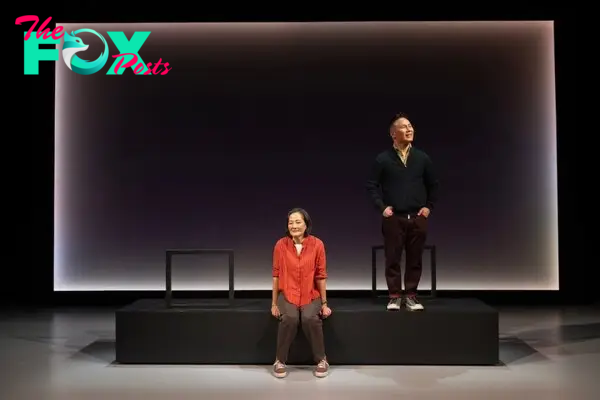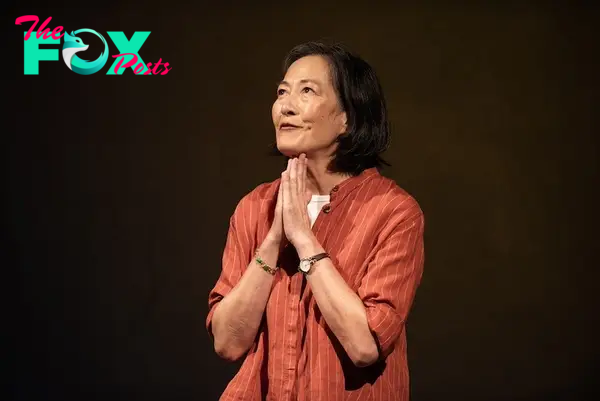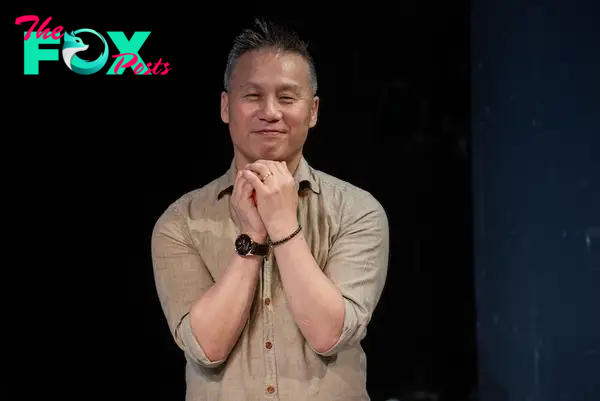Entertainment
What Turned of Us Evaluation. Immigrant Siblings, Quirky Selections. – New York Theater

“What Turned of Us” is at coronary heart a modest, transferring two-character play a couple of brother and a sister, the kids of immigrant dad and mom, who inform us about one another over the course of their complete lifetimes. It’s an usually participating, someday poignant have a look at the evolution of a sibling relationship, coloured by the older sister having been born overseas, the brother born after their dad and mom immigrated. However the manufacturing can also be shot via with a number of uncommon selections, which I discovered alternately modern and undermining; generally simply baffling.
This started earlier than I even entered the theater, with a discover in pink ink tacked to the door informing us that the play will characteristic scents of orange and lavender.
What an odd set off warning, I assumed, absolutely pointless. However then, I assumed, who am I to guage different folks’s sensitivities? Or possibly it’s a joke?
I felt equally unsure about the principle quirk, or innovation, or gimmick of the manufacturing. There are two units of casts: Rosalind Chao and BD Wong, each of Asian descent, are at the moment portraying the siblings; that’s who I noticed within the roles. In just a few days, Shohreh Aghdashloo and Tony Shalhoub, each of Center Japanese descent, utterly take over the roles. However for 4 performances, we’re advised within the advertising materials, “each casts will carry out back-to-back as an unique double-feature occasion.”
The choice to make use of separate casts of various ethnic origins is baked into playwright Shayan Lotfi’s script, which stays unchanged irrespective of who’s portraying the characters. It is a predominant cause why the script in essential elements favors the generic over the actual, and too usually seems like a writing train. The characters are given the names Q and Z, and speak about “The Outdated Nation” and “This Nation.” This suMMAry method feels echoed within the set, which is little greater than an abstract-looking bench that the 2 characters sometimes rotate, and the distancing impact is emphasised by director Jennifer Chang’s staging, during which the 2 actors hardly ever have a look at each other, as an alternative face the viewers.
Probably the most beneficiant interpretation of the selection right here is that the playwright needs to exhibit the similarity amongst immigrant households. Nevertheless it leads to some strained writing, which now and again dips into cliché.
“They led lives in The Outdated Nation extraordinary solely of their excessive ordinariness,” Q tells us.

That is within the first part of the play, when Q (Chao) is on stage by herself, describing her dad and mom’ life within the Outdated Nation, their resolution to immigrate to This Nation, and the way, as soon as arrived, they labored their approach up from promoting snacks outdoors workplace buildings to working a newsstand to proudly owning a nook retailer. Every sentence that Q says on this part begins with “They…”

Z (Wong) then seems on stage, and Q says: “You have been born one yr, two months, and 6 days after we arrived to This Nation. “ The 2 then take turns speaking about one another, starting every sentence with “You…”
The 2 use this building to explain numerous moments of their respective childhoods, sometimes presenting dialogue between the 2 by having every preface the opposite’s line with “You stated….”
An image emerges of the obedient daughter and the rebellious son.
Z says of Q: “You have been accepted right into a college, one of many fancy ones the place the buildings are older than This Nation, with a nearly-full scholarship. You listened quietly as our dad and mom stated it will be a betrayal to go away. “
Later, Q says of Z: “You left for culinary college on the opposite facet of the nation, regardless of the very fact you have been by no means seen cooking, not as soon as.”
Their differing attitudes towards their dad and mom ultimately trigger a rift between them.
That results in the third part, the place every sentence begins with “I” as they describe their separate lives aside. Q has turn into a librarian, and takes a sabbatical to the Outdated Nation. Z turns into a husband and a father, to a baby he refers to solely as “the Golden Baby.” (“I started to permit myself to see issues via the Golden Baby’s eyes, a world with infinite sources of marvel and amazement.”) It’s the youngster’s query about household that prompts Z, after so a few years, to name his sister. “He’d love to satisfy you, in the event you wished to?”
Within the fourth part, every of the characters takes turns saying three sentences, the primary starting with “You,” the second with “I,” the third with “We.”
Within the fifth part, as they develop previous, the sentences from every start “I” after which “You”
As a writing train, I suppose this strict building exhibits spectacular self-discipline, and maybe offers grist for future college essays. However, just like the set off warning, it feels pointless.
It’s a testomony to the elements of Lofti’s script which are concrete and particular, in addition to to the performances by Chao and Wong, that one can finally really feel the characters embodied and explicit. There are moments when their lives as foreigners in a brand new land hit with some pressure (“You cried once we got here residence one night time to seek out our home windows smashed, our father mendacity to you that it was merely random.”) However their issues as newcomers are far more evident when they’re younger; their relationship takes middle stage as they age. “What Turned of Us” is most touching as a result of so many people are additionally touched by a sophisticated relationship with a member of the family with whom we have now grown up, aside, and previous collectively.
What Turned of Us
Atlantic Stage 2 via June 29
Operating time: 75 minutes with no intermission
Tickets: $81 to $195
Written by Shayan Lotfi
Directed by Jennifer Chang
Units by Tanya Orellana, costumes by Rodrigo Muñoz, lighting by Reza Behjat, authentic music and sound by Fan Zhang
Forged: Rosalind Chao as Q and BD Wong as Z via June 15, 2024. Shohreh Aghdashloo as Q and Tony Shalhoub as Z June 10 – June 29, 2024. Each casts will carry out back-to-back June 11-13 “as an unique double-feature occasion.”
Associated
-

 Entertainment5h ago
Entertainment5h agoHow to See Ava, Chiang Mai Night Safari’s Golden Tiger
-

 Entertainment5h ago
Entertainment5h agoDictionary.com Names ‘Demure’ as Its Word of the Year for 2024
-

 Entertainment7h ago
Entertainment7h agoAnna Delvey Reunites With Ezra Sosa and Flips Him Off Ahead of ‘Dancing With the Stars’ Finale Return
-

 Entertainment10h ago
Entertainment10h agoMethods to Recharge as an Actor
-

 Entertainment10h ago
Entertainment10h agoWeak Sign: October 4, 2024 Tubby’s
-

 Entertainment10h ago
Entertainment10h ago‘Gladiator II’ Ending Breakdown: Did Lucius Realise Maximus’ Dream of Rome?
-

 Entertainment16h ago
Entertainment16h agoGet to Know Bluesky, the New X Alternative with 18 Million Active Users
-

 Entertainment16h ago
Entertainment16h agoChuck Woolery, Smooth-Talking Host of Love Connection and Wheel of Fortune, Dies at 83

















